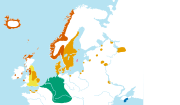Look up oi in Wiktionary, the free dictionary. Oi /ɔɪ/ is an interjection used in various varieties of the English language, particularly Australian English...
11 KB (1,201 words) - 05:35, 8 November 2024
manage Oi (digraph), a Latin-script digraph Oi (interjection), an interjection used to get someone's attention, or to express surprise or disapproval Oi language...
2 KB (282 words) - 01:57, 26 October 2024
languages Oi (interjection), sometimes spelled "oy", a British slang interjection used to get someone's attention Uk (Оу оу), a cyrillic homoglyph of Oy Oi (disambiguation)...
2 KB (247 words) - 01:21, 8 July 2024
television series Hoe (food), various Korean raw fish dishes Hoi polloi Oi (interjection) This disambiguation page lists articles associated with the title...
649 bytes (122 words) - 13:28, 18 April 2023
up OH or oh in Wiktionary, the free dictionary. Oh, OH, or Oh! is an interjection, often proclaiming surprise. It may refer to: Oh! (Girls' Generation...
3 KB (396 words) - 23:46, 10 November 2024
'hey'. ‘Ahoy’ originated in the seafaring world, where it was used as an interjection to catch the attention of crew members and as a general greeting. It...
54 KB (7,692 words) - 15:04, 22 September 2024
pity/sympathy/worry-expressing interjection.: 19 As in ᠡᠢ ei (ий ii), an compassion/sorrow/fright/disgust-expressing interjection.: 303 As in ᠣᠢ oi (ой oi) 'woods, forest...
20 KB (770 words) - 11:31, 26 October 2024
Eh (category Interjections)
/ˈɛ/) is a spoken interjection used in many varieties of English. The oldest Oxford English Dictionary defines eh as an "interjectional interrogative particle...
27 KB (3,506 words) - 18:32, 10 August 2024
Shport; Kyoo, This Word Sounds Weird: A Case Study of a Cajun English Interjection. American Speech 1 May 2023; 98 (2): 123–155. doi: https://doi.org/10...
35 KB (3,026 words) - 02:44, 18 October 2024
character "/", as shown in the following table, but note that the sequence for /ɔɪ/ is delimited by two slash characters at either end: To this collection are...
12 KB (919 words) - 23:42, 24 June 2024
as with other languages, other phonemes can occur occasionally in interjections or recent borrowings. Notable features of Romanian include two unusual...
39 KB (3,322 words) - 04:06, 26 October 2024
consonant clusters article for more information. oe /ɔɨ̯, ɔːɨ̯/ /ɔi̯/ boy oi /ɔi̯/ /ɔi̯/ boy ou /ɔɨ̯, ɔːɨ̯/ /ɔi̯/ boy ow /ɔu̯/ /ɔu̯/ goal uw /ɨu̯/ /ɪu̯/ not present...
24 KB (2,126 words) - 18:55, 21 November 2024
called Bàn Thiên. Television program Gặp nhau cuối năm An interjection used in Vietnamese "Trời ơi!" (hey heavenly (lord)) is often translated into English...
10 KB (1,025 words) - 15:06, 9 November 2024
foot–goose merger) /ʌ/ as in putt There are a few exceptions, mostly in interjections: eh and meh with /ɛ/; duh, huh, uh, uh-uh, and uh-huh with /ʌ/; nah...
7 KB (850 words) - 10:27, 1 September 2024
diphthongs (/ai ui ɛi au iɛ uɔ iu (ɔi) ɛu (ɔu)/), although some diphthongs are mostly limited to proper names and interjections. Standard Latvian and, with a...
9 KB (682 words) - 18:02, 28 October 2024
List of Latin-script digraphs (redirect from Oi (digraph))
cloître. ⟨ói⟩ is used in Irish for /oː/ between a broad and a slender consonant. It is also used in Portuguese. ⟨òi⟩ is used in Piedmontese for /oi̯/. It is...
150 KB (16,679 words) - 19:56, 19 November 2024
conjunctions into subordinators and coordinators, and add the class of interjections. English also has a rich set of auxiliary verbs, such as have and do...
228 KB (23,164 words) - 00:11, 21 November 2024
IPA (English) IPA (Irish) Part of speech Meaning Abú /əˈbuː/ /əˈbˠuː/ Interjection Hooray! Used in sporting occasions, especially for Gaelic games – Áth...
100 KB (8,260 words) - 23:40, 14 November 2024
vowels are rare in Luiseño, typically reserved for absolutes, such as interjections, e.g. aaashisha, roughly "haha!" (more accurately an exclamation of...
18 KB (1,473 words) - 21:55, 14 November 2024
Interjections and exclamations (感動詞) Interjections are classified as an independent, non-conjugating part of speech, where it does not modify or connect...
101 KB (4,355 words) - 20:23, 21 November 2024
Manglish (section Interjections)
ethnic groups tend to intersperse varying amounts of expressions or interjections from their mother tongue – be it Malay, Chinese or one of the Indian...
45 KB (5,608 words) - 09:31, 4 October 2024
by the classical epoch; ei remained only in a few words such as the interjection hei. If there is a tréma above the second vowel, both vowels are pronounced...
77 KB (8,174 words) - 07:16, 19 November 2024
ago), such as ¿Qué has dicho? No te he oído rather than ¿Qué dijiste? No te oí. ('What did you say? I couldn't hear you.') The Portuguese present perfect...
12 KB (1,786 words) - 11:19, 6 August 2024
reef), especially one set in deeper open water. Muddo or muddasick (interjection) – an expression used to represent excitement, surprise, or shock. Mussy...
19 KB (1,594 words) - 03:14, 18 October 2024
Multicultural London English (section Interjections)
directional and diachronically gradual process. The change (from approximately [ɔɪ]) involves lowering of the onset, and as such, it is a reversal of the diphthong...
58 KB (5,299 words) - 20:03, 15 November 2024
the English equivalent of 'cunt'. Also a general negative expletive/interjection in colloquial speech. Abbreviates to "CB" in digital communication. jibra...
103 KB (12,828 words) - 07:27, 20 November 2024
(þvert) Prepositions – till (til), fro (frá) Conjunction – though/tho (þó) Interjection – hail (hæill), wassail (ves hæill) Personal pronoun – they (þæiʀ), their...
112 KB (8,843 words) - 17:12, 31 October 2024
otherwise merged with /k/, see Lock–loch merger. This common English interjection is usually pronounced with [x] in unscripted spoken English, but it is...
66 KB (1,837 words) - 16:04, 3 November 2024










